Download the Newsletter here in PDF
AUGUST 2015
 The year of religious life. A voice not in the chorus…To help us reflect!
The year of religious life. A voice not in the chorus…To help us reflect!
Pope Francis proclaimed 2015 the ‘year of religious life’: a decision that was perhaps expected after the Year for Priests called by Pope Benedict and which should animate a year dedicated to achieving greater awareness of the gift that religious life is for the Church and of its charismatic importance in the Christian community and in the company of men: a time of fervent intercession calling on the Lord to renew this form of life that involves following Christ. But despite the messages of Pope Francis to those who live following Christ in celibacy and in common life, and despite the fact that some bishops have established a day for that ‘small remnant’ present in their local churches, by now this year is coming to its end and few people seem to realise this, not only in the world but amongst Catholics as well.
This fact provokes an infinite sadness because, after choosing this life during my youth – I hope as a response to a call of the Lord – and after living this life for fifty years, until my old age, I must now acknowledge the deep crisis that exists. A crisis that I myself, trying to read it with hope, have defined as a paschal crisis and where today I manage to see a horizon of hope only with difficulty. And what most troubles me is the indifference with which this ‘diminutio’, if not fading, is observed.
It is significant that not even the Synod that is about to be celebrated thought of making a reference in its Instrumentum laboris to celibacy for the kingdom of God and to the forma vitae that it has generated in the Church: how is it possible to speak about Christian marriage and the family without reflecting on the announcement of celibacy for the kingdom made by Jesus? The Fathers of the Church – and orthodoxy here is still their faithful interpreter – never isolated out marriage from Christian celibacy because the two illumine each other, as is borne witness to by the words themselves of Jesus in the gospels and by the preaching of St. Paul.
But what is happening in religious life given that even that life itself is not living this year that concerns it in a convinced way? The silence, the disappointment, the tiredness and the inertia of many who belong to this life, which seems to have lost its savour and the capacity for prophetic signs, is striking. Why have we moved from the abundance not only of vocations but also of initiatives and deaconates of forty years ago to the present ‘misery’? I have repeated on a number of occasions that the current crisis of religious life is not of a moral character – perhaps more than ever before over recent centuries the vast majority of religious are faithful to the vows that they have professed – but one of a human character.
Then, paradoxically, in this situation of poverty we are witnessing almost everywhere initiatives involving religious life where men and women who left communities in which they had taken vows have taken up special pathways in two or threes in a state of fusion and with unhealthy ties which were already stigmatised by St. Benedict in the first chapter of his Rules. ‘Do-it-yourself’ consecrated life closed up in ‘one’s own pens and not those of the Lord’ (RB 1:8) and removed from all authoritative external vigilance: wasted energies and lives marked by suffering, in relation to which there is often a lack of attention and prudence on the part of bishops who, in accepting these ‘adventures’, appear to be only concerned to fill up houses and churches that have been abandoned and deserted.
For that matter, vital problems that are apparently in opposition to one another are shared by traditional communities as well as by new ones. The first are diminishing because of the ages of their members and a lack of vocations and their members no longer want to hear questions about their future because for decades they have been satisfied with repeating formulas of renewal whose implementation is based upon illusion and not faith. On the other hand, the sudden vitality of many new forms is often contradicted by devastating scandals at a human level, even before they are such at a religious level.
Thus religious life dies and is helped to die. Everyone, however, should face up to their own responsibilities because in an epoch when people are fragile and discipleships contradict one another, when ties disappear and membership becomes affective and no longer a matter of belonging to a community, we need an appeal to ‘fortitude’, to consistency, to perseverance in our vows, to the objectivity of a life in common that is not subjected to exaggerated forms of personal self-affirmation. A religious life, that is to say, that is rooted in the local Church, under the vigilance of the bishop or the authority of the Congregation; a transparent life which, without seeking to be admired, should be present in the fabric of the Church and of society.
A paschal crisis, therefore, or disappearance; a good death in general silence? And yet a remnant will remain: if religious life is also reduced to a mere lineage, but that lineage is holy, it will be able to offer, once again, some new shoots.
Enzo Bianchi
Source: monasterodibose.it, 15/08/2015
TAIWAN
A new geriatric hospital in Lotung
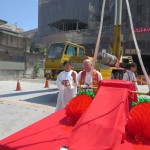


By now traditional Taiwanese society is also changing: with the drastic fall in births society is ageing rapidly. The new geriatric hospital is in continuity with the changed social context and its immediate needs.
The ordination of our religious brother Henry II Angupa as a deacon.



The second visit to Yunnan, in China, visiting people with leprosy
(A brief account by Fr. Giuseppe Didoné)
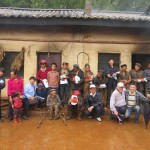


THAILANDIA
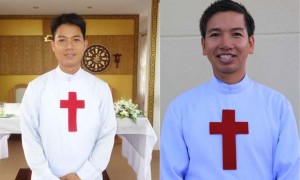


CHILE



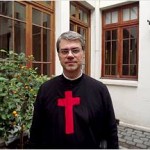


HAITI



DENMARK
A historical curiosity in Denmark



In 1926 they built a new church, the current St. Mary’s Parish. The modern pastoral work of the Camillians in Denmark finished in the year 1984 but it has been borne witness up to now by the pictures of St. Camillus and Our Lady of Health in the parish church and also by the hospice which offers palliative care to twelve patients and bears the name ‘Kamillianer Gaarden’.
On 18 July last the Filipino community of St. Mary’s Parish in Aalborg came together for the first time to celebrate the feast day of St. Camillus, with a celebration of the Eucharist presided over by Fr. Mario Didonè.
BUCCHIANICO
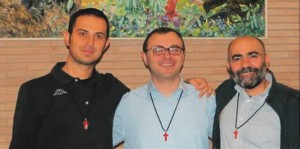


Download here the ‘Invitation and the Programme
THE YEAR OF CONSECRATED LIFE
The world meeting of young consecrated men and women
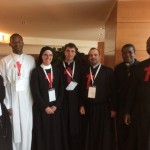


NEPAL
The Camillian Task Force (CTF) active in Nepal on a mission of support and rehabilitation



SIERRA LEONE



Amongst the many positions that he has held, we may point out that that from 1986 to 1992 he was the rector of the Minor Seminary of San Juan del Rio (Mexico), and then regional Vice-Superior and Superior of the Saverians in Mexico.
After moving to Sierra Leone he was a parish priest in Madina, in the diocese of Makeni, and then regional Superior of the Saverians of Sierra Leone. Since 2011 he has been the apostolic administrator of the diocese of Makeni.
Natale has for long had close ties with Camillian religious: first he welcomed us, hosted us and supported us in Mexico during the first stages of the opening of the community of Guadalajara, and then more recently he welcomed us and supported is in the project of the Camillian Task force in Sierra Leone against the Ebola virus to support the poor population which was exhausted by disease and death. To Fr. Natale go our most sincere best wishes that he may continue to be a pastor according to the heart of God and always ‘with the scent of sheep’.
You can continue to follow the updating of the activities of Camillians involved on the front of support and rehabilitation for the survivors of the Ebola virus through the ‘Brothers of Ebola’ project.
A conversation with Fr. Natale Paganelli, the new Bishop of Makeni, Sierra Leone
Report at the end of the third two-month period (May – June 2015) Support for 400 family units
Brothers of Ebola: the return to Italy of Br. Luca Perletti from Sierra Leone
THE WOMEN MINISTERS OF THE SICK OF ST CAMILLUS



The celebration will take place on Tuesday 16 September next at their generalate house of Rome-Giustiniana and will be presided over by Fr. Laurent Zoungrana, the Vicar General of our Order.
WAJIR – KENYA
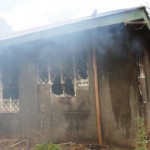


COLOMBIA ECUADOR
The ordination of a deacon



The feast day of St. Camillus in Bogota (a brief report by Fr. Angelo Brusco)



CPE (Clinical Pastoral Education) INFORMATION
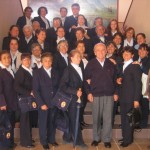


THE DELEGATION OF NORTH AMERICA – U.S.A.
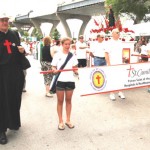


Look here at the video of the celebrations in honour of St. Camillus in Milwaukee.
LIMA – PERU
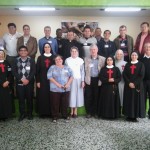


DUBLIN



THE PHILIPPINES



This happy jubilee event was a good opportunity for the religious of the Province of the Philippines to give thanks to the Lord. The choice of the theme for the jubilee reflected these feelings of gratitude: ‘Magnify Him with Thanksgiving’ (Ps 69:30).
Camillians, their family relatives, their friends, their co-workers and their benefactors celebrated this happy anniversary on 8 July of this year with a solemn celebration of the Eucharist that was presided over by the Provincial Superior, Fr. Rolando J. Fernandez, at the St. Camillus and St. Lorenzo Ruiz Church in Loyola Heights, Quezon City.
THE AGENDA OF THE SUPERIOR GENERAL
Leocir Pessini, the Superior General of the Order, on 29-30 July took part in the general assembly of the Secular Institute of the Women Missionaries of the Sick ‘Christ the Hope’ in Verona-S. Fidenzio.
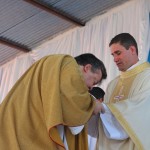





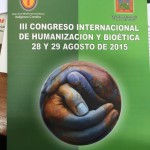


At the beginning of September, after the Congress of Moral Theology in Brazil.
From August 31 to September 4, fr. Laurent Zoungrana , General Vicar of the Order, will attend the XIX meeting of camillian formators who live and work in the Pan-American area.



He will then go to Quito (Ecuador) to take part in the International Congress on Palliative Care.
With the General Consultor Fr. Aris Miranda (who will already be in Thailand on 19-24 October of this year for the forum of leaders of the Camillian Task Force), Fr. Leocir will visit our religious brothers of the Camillian communities of Indonesia (from 4 November onwards) and in Australia.
On 25-27 November, Fr. Leocir will take part in the Union of Superior Generals in Rome.
LOOK AT THE ATTACHMENT IN THE FOLDER
THE DAUGHTERS OF ST CAMILLUS
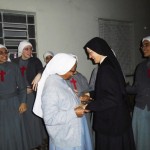


DECISIONS OF THE GENERAL CONSULTA
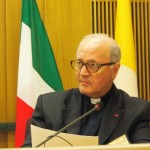


The three camillian religious of the Vice-Province of Burkina Faso, Mali-vla-défaa Hermann Kpiele Somda, Wénébé Benjamin Zoungrana and Ferdinand Nana, have been admitted to the perpetual profession of their religious vows.
DECEASED RELIGIOUS






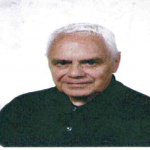


‘Now they live in Christ whom they met in the Church, followed in our vocation, and served in the sick and the suffering. Trusting that the Lord, the Holy Virgin our Queen, St. Camillus, the Blessed Luigi Tezza and the Blessed Giuseppina Vannini, and our deceased religious brothers and sisters, will welcome them in their midst, we commend them in our prayers, remembering them with affection, esteem and gratitude’.





